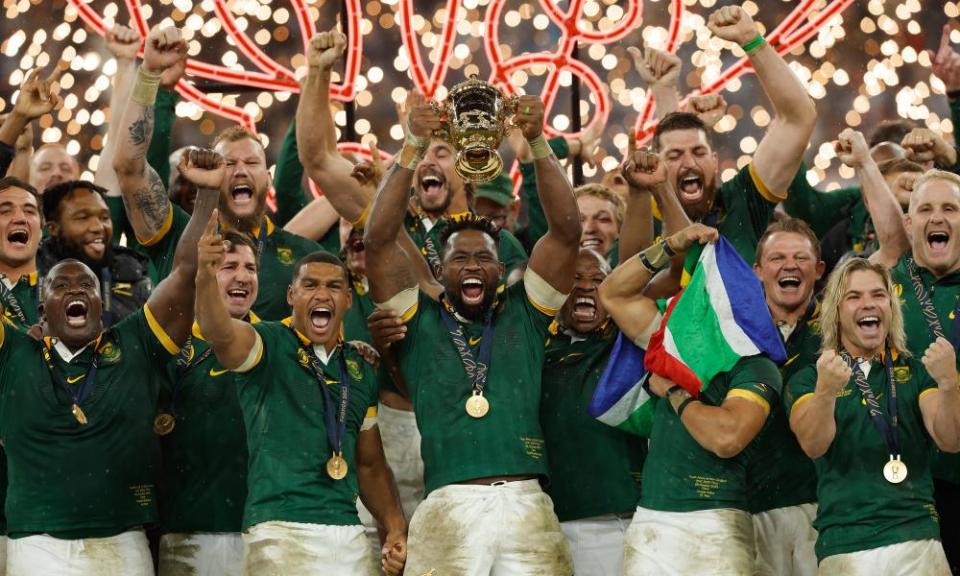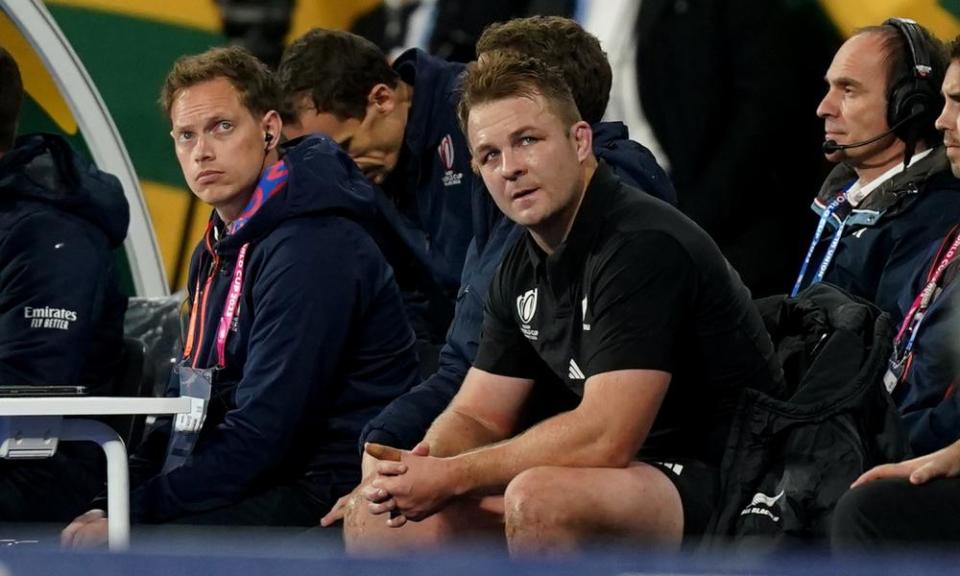South Africa beat New Zealand to win men’s Rugby World Cup final

No one had ever won four men’s Rugby World Cup titles. And, even on a soggy Parisian evening, this really did have the feel of a truly momentous occasion. South Africa have successfully defended their crown and any arguments about the most dominant rugby nation on earth can be temporarily laid to rest.
What an epic, seesawing contest it was. It will be remembered as a tale of two captains. When Siya Kolisi, South Africa’s first black rugby captain, hoisted the Webb Ellis Cup aloft in Japan four years ago it was one of the sport’s most memorable images and now, for every Springbok supporter, there is a glorious sense of deja vu. For his All Black counterpart, Sam Cane, in contrast, it turned out to be the darkest of nights.
Related: Siya Kolisi inspires South Africa to keep finding point of difference | Jonathan Liew
There had been little to separate the teams before Cane was sent off, after a video review, for an upright tackle on Jesse Kriel in the 27th minute. There have been worse tackles, delivered with greater force, but once the phrase “a high degree of danger” is employed there is usually only one outcome. Never before has a player been sent off in a World Cup final, let alone an All Black skipper.
The heart-pounding drama, though, was far from over. Kolisi was shown a yellow card five minutes after half-time for making contact with the head of Ardie Savea, encouraging the 14-man New Zealand to launch a frenetic fightback. The All Blacks had a “try” by the scrum-half Aaron Smith ruled out because of a knock-on by Savea in the buildup but then scored a legal one through Beauden Barrett just before the hour to set up a grandstand finish, with his brother Jordie missing a long-range penalty attempt with seven minutes left.
Up in the stands two of tennis’s all-time greats, Roger Federer and Novak Djokovic, would have empathised with the gladiatorial combat. The Springboks, with Handré Pollard kicking superbly and the all-action Pieter-Steph du Toit reproducing the form that made him world player of the year in 2019, are never done and have become only the second men’s team, after New Zealand in 2015, to win successive finals.
It was always going to be thunderous. These two fiercely proud nations have been playing rugby union against each other for 102 years but some games are bigger than others. You could see it in the faces of the South Africa players as they belted out the anthems and in focused Kiwi eyes during the Haka.
The weeping skies made it feel all the more intense. Never mind Jacques Nienaber, the volume of pre-game rain would have made Jacques Cousteau feel at home. For New Zealand a slippery ball was potentially bad news. More spillages equates to more scrums. And this South Africa side, as England can attest, absolutely loves scrummaging. Before Barrett’s score the Springboks had also never conceded a try in three World Cup finals.

In the event, it was South African bloody-mindedness that once again proved decisive. Incredibly they won all three of their knockout games by a single point, making light of all manner of adversity. In this case it was the loss of their hooker Bongi Mbonambi after just three minutes, victim of a falling, twisting tackle by Shannon Frizell which did not look great in slow motion. It forced South Africa to revert to the 37-year-old Deon Fourie and capped an already difficult personal week for Mbonambi.
Related: New Zealand waited until they had nothing to lose before starting to play | Andy Bull
South Africa’s early territorial advantage, even so, yielded two penalties for Pollard before the All Blacks stepped it up with Savea almost reaching a deft little attacking chip from Jordie Barrett. Aside from a Richie Mo’unga’s penalty, though, New Zealand could not find the killer touch and Pollard, as against England, landed a superb long kick to restore his side’s six-point advantage.
The All Blacks needed to keep calm but, instead, their composure temporarily disappeared. A couple of lineouts went astray and soon enough they were back down to 14 men following Cane’s costly indiscretion. Up the other end went South Africa and won a turnover penalty which Pollard was lining up when the news was relayed that Cane would not be returning. Over went the kick and New Zealand were right up against it.
Download the Guardian app from the iOS App Store on iPhone or the Google Play store on Android by searching for 'The Guardian'.
If you already have the Guardian app, make sure you’re on the most recent version.
In the Guardian app, tap the Menu button at the bottom right, then go to Settings (the gear icon), then Notifications.
Turn on sport notifications.
No team behind at half-time has ever won a men’s Rugby World Cup final and, at 12-6 down, the Bok defence was not falling for the All Blacks’ deft midfield interplay. Following Kolisi’s departure, though, the momentum of the contest shifted yet again and New Zealand, having turned down kickable penalties to go for the corner, deserved their reward when Mark Telea found a little space on the left and his offload was adjudged to have bounced backwards before Beauden Barrett scooped it up to score.
The final quarter was equally breathless, even before Cheslin Kolbe was sent to the sin-bin by the authoritative Wayne Barnes seven minutes from time for a deliberate knock down. It has been not been an entirely flawless tournament – overly long and frustratingly lop-sided at times – but the best games have been as compelling as any sport you could wish to see. And in South Africa they can now bask in the ultimate glory. The northern hemisphere – one World Cup triumph in 10 attempts – has an awful lot of catching up to do.

